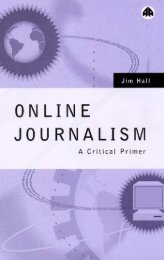Modul Mata Kuliah Journalisme Online - Ayo Menulis FISIP UAJY
Modul Mata Kuliah Journalisme Online - Ayo Menulis FISIP UAJY
Modul Mata Kuliah Journalisme Online - Ayo Menulis FISIP UAJY
You also want an ePaper? Increase the reach of your titles
YUMPU automatically turns print PDFs into web optimized ePapers that Google loves.
7. Start a blog, now: With blogging, an awkward term, we designate a fairly beautiful thing: the<br />
extension to many more people of a First Amendment franchise, the right to publish your thoughts<br />
to the world. Wherever blogging spreads the dramas of free expression follow... A blog, you see, is a<br />
little First Amendment machine. Jay Rosen<br />
8. Get over the arrogance, as well: We can’t expect consumers to come to us. It’s arrogant for any<br />
media company to assume that. - Quincy Smith, CBS Interactive<br />
9. People will know the truth: Most [PR] agencies are a waste of time and you should fire them…I will<br />
never have a separate budget for new marketing. - Alan Scott, Dow Jones<br />
Speed vs Accuracy in <strong>Online</strong> Journalism<br />
Laura Oliver http://pebbledash.wordpress.com<br />
First or fast?<br />
News organisations face a starker choice online between:<br />
First with the news BUT not always right?<br />
Last with the news BUT more accurate reporting?<br />
But : “ How fast is too fast, when news must be more than mere glorified rumours ? And how<br />
much accuracy is too much, when news must be current ?” [Paper on online journalism ethics,<br />
University of Wisconsin]<br />
Case study: London 7/7 bombings<br />
Sky News ran with rumours that the blasts had been caused by bombs. It updated with facts and<br />
reported previous claims as false as events progressed. The BBC continued to report ‘a power<br />
surge’ until the bombs had been officially confirmed.<br />
“ News does not usually break cleanly. Big stories emerge in dribs and drabs, bits of information<br />
from many sources - often conflicting and confusing. At Sky News we specialise in drawing<br />
together all these strands to try to make sense of them - as they happen.<br />
“ We have always believed in taking the audience into our confidence and sharing facts as soon<br />
as possible. That means that when a big news story is unfolding we report new information,<br />
clearly attributed to its source, even if subsequently things turn out differently .” [John Ryley,<br />
head of Sky News]<br />
“ In what ways is the internet changing the fundamental values of journalism?” Loosening<br />
standards/less carefulness 45% Allowing others to have a voice (good/bad) 31% Emphasis on<br />
speed (good/bad) 25% [Pew Project for Excellence in Journalism 2009 State of the News Media<br />
study]<br />
Reporting speculation and verification<br />
“ Facts can be very misleading. Rumours - true or false - are always revealing.”<br />
[Inglourious Basterds]<br />
Case study: Mumbai bomb attacks<br />
“ [O]n a major unfolding story there is a case also for simply monitoring, selecting and passing<br />
on the information we are getting as quickly as we can, on the basis that many people will want<br />
to know what we know and what we are still finding out, as soon as we can tell them.” [Steve<br />
Herrmann, editor, BBC News website]<br />
BBC’s live updates Ushahidi.com<br />
Is first best?
















